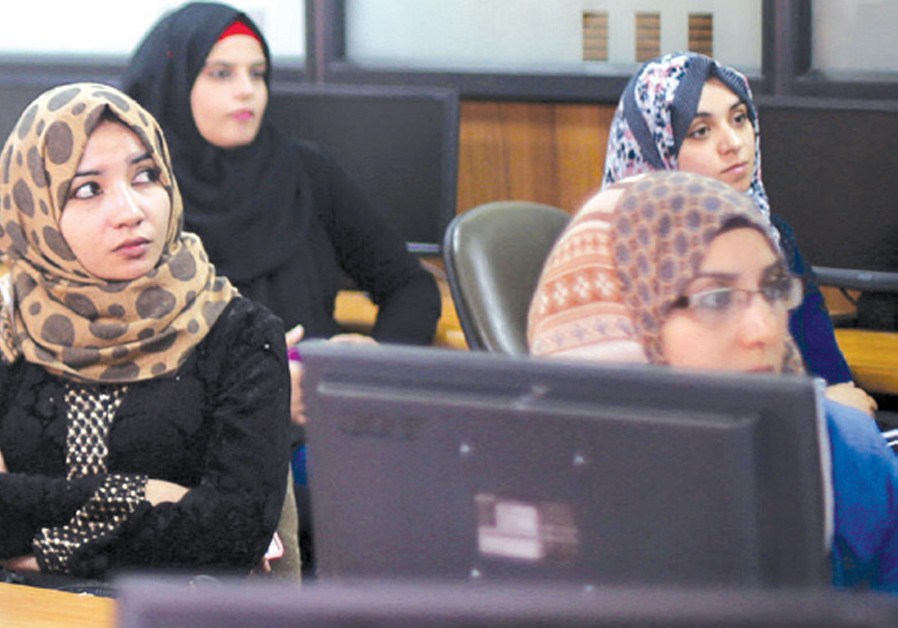PALESTINIAN ENTREPRENEURS attend a training session in the UCAS Technology Incubator office in Gaza.. (photo credit: IBRAHEEM ABU MUSTAFA / REUTERS)
This past summer we traveled all across the country as interns of the Ambassadors’ Club of Israel, and met a diverse group of people. In many of our conversations, we noticed one recurring issue when discussing any hope for peace between Israelis and Palestinians: youth education.
As International Youth Day is being celebrated today with “Transforming Education” as its theme, and a new school year is rapidly approaching, we find it appropriate to call for a reform of the Palestinian educational system.
“Building peaceful societies” is a major goal of this year’s theme, and one which we wholeheartedly condone.
The Palestinian educational system is particularly problematic in this regard because it instills institutionalized hatred toward Israelis. For instance, many Palestinian textbooks praise martyrdom among other violent acts directed toward Israelis. Math problems from such textbooks include adding up the numbers of Jews killed in the First and Second Intifadas.
As Israel Hayom revealed just last month, the latest Palestinian textbooks are even worse than previous versions that the international community asked be revised. In fact, Palestinian history books falsely claim that there was no Jewish presence in the region until the 20th century. This problem in Palestinian education is globally recognized, as was demonstrated by Belgium cutting funding from all West Bank schools because they are named after terrorists.
The evidence is overwhelming of anti-Israel, anti-Zionist and antisemitic elements being taught in many Palestinian schools, which continues to serve as an obstacle to peace. As the UN urges, it is critical to “update education plans and school curricula to include lessons about peace.” The current Palestinian education system is dangerously far from this goal.
Furthermore, the European Union has finally pledged to investigate the Palestinian school curriculum to ensure that it is in accordance with UNESCO standards of peace and tolerance. We urge the newly elected leadership of the EU to prioritize their investigation in order to significantly contribute to peace.

There are actionable transformations that can take place in the Palestinian territories to improve youth education beyond simply revising textbooks. Transformation should occur to allow interaction and communication between young Palestinians and Israelis. In addition to transforming school curriculum, the UN points out that “youth-led organizations” and “youth engagement” are crucial for change. Such potential forms of engagement could include a joint Israeli-Palestinian youth sports team, Seeds of Peace camp, or another platform to amicably and apolitically bring together youth.
On the Israeli side, change should occur among those who harbor racist and xenophobic sentiments towards their Palestinian neighbors. Although the Israeli educational system is focused on peace, some young Israelis are taught in a very nationalistic manner, which often results in hatred. This urgently needs to be addressed.
Hate-based education stifles all prospects for future peace and dialogue, and needs to be immediately transformed in order to create an atmosphere of reconciliation between Palestinians and Israelis. All students must be educated about conflict resolution and the need for peace, as well as the humanity of the other, in order to create a more livable world of tolerance rather than hate. Normalization of Israeli-Palestinian relations can happen only once this transformation in education takes place.
[“source=jpost”] Techosta Where Tech Starts From
Techosta Where Tech Starts From
